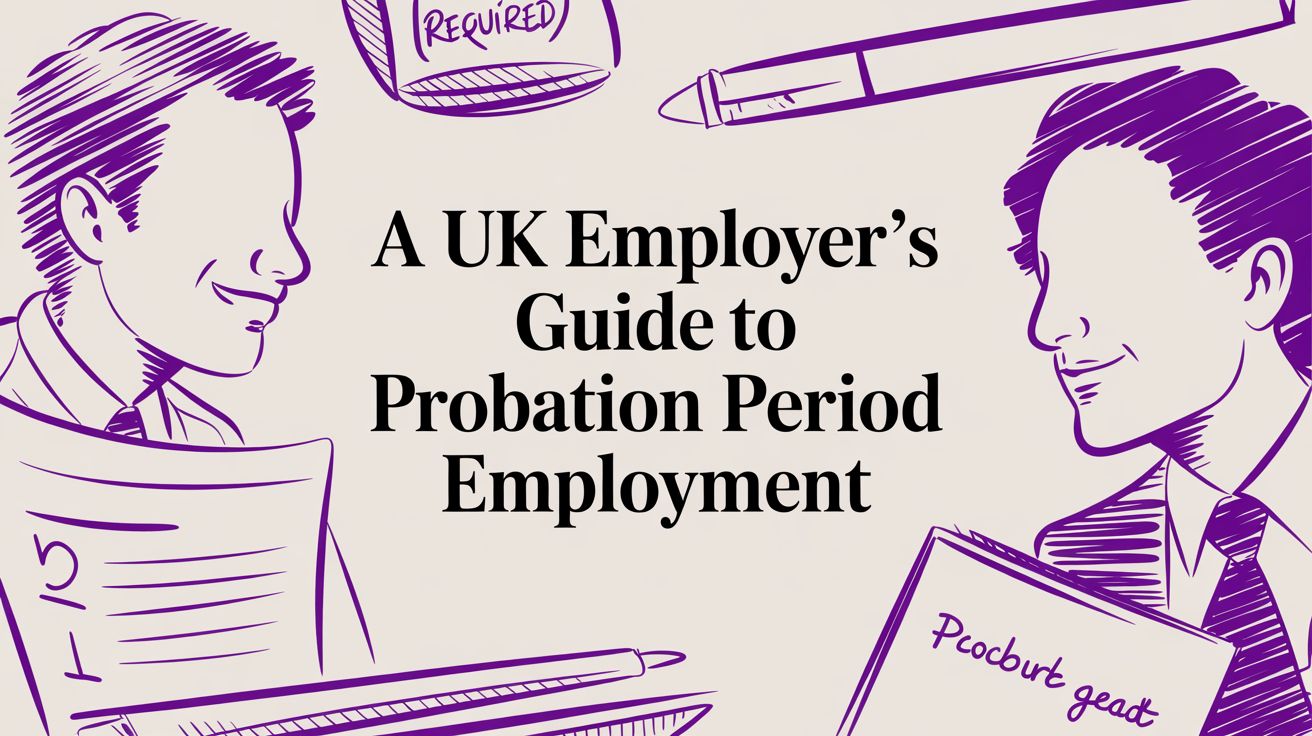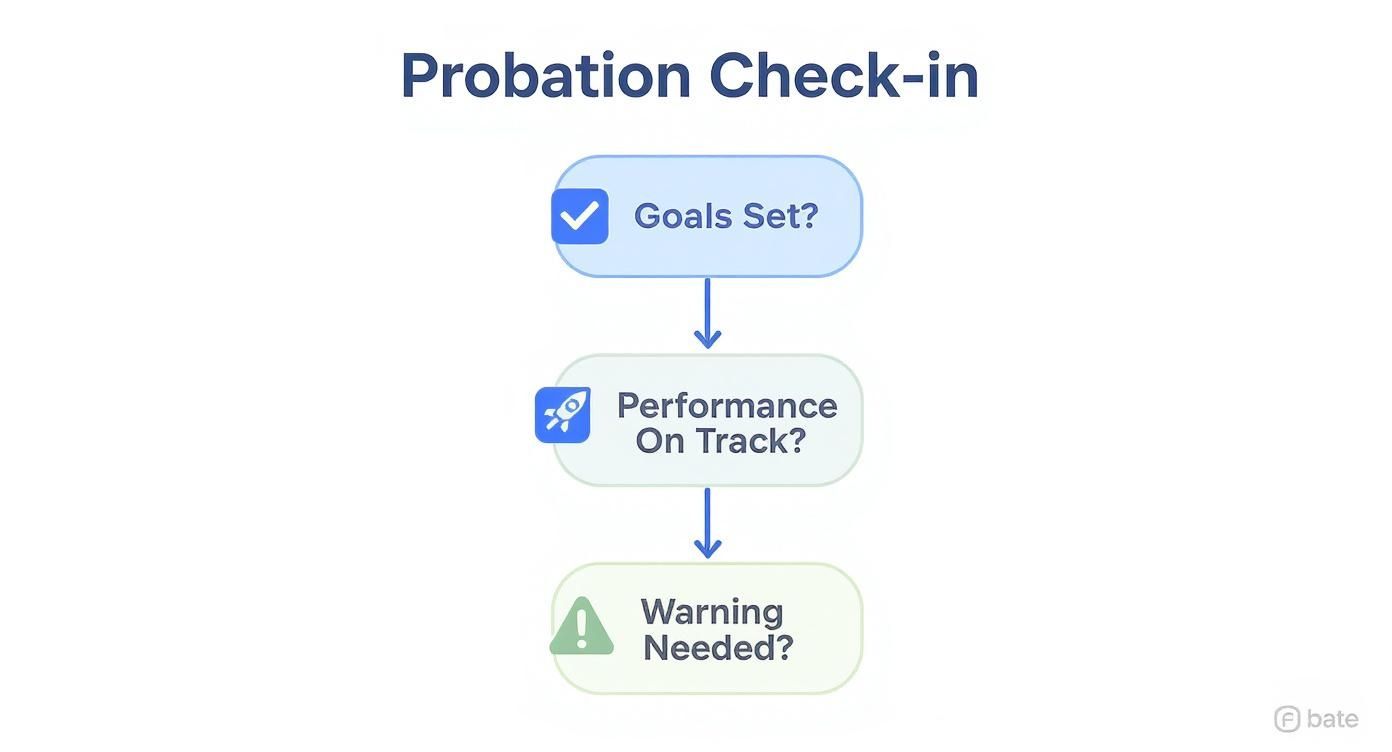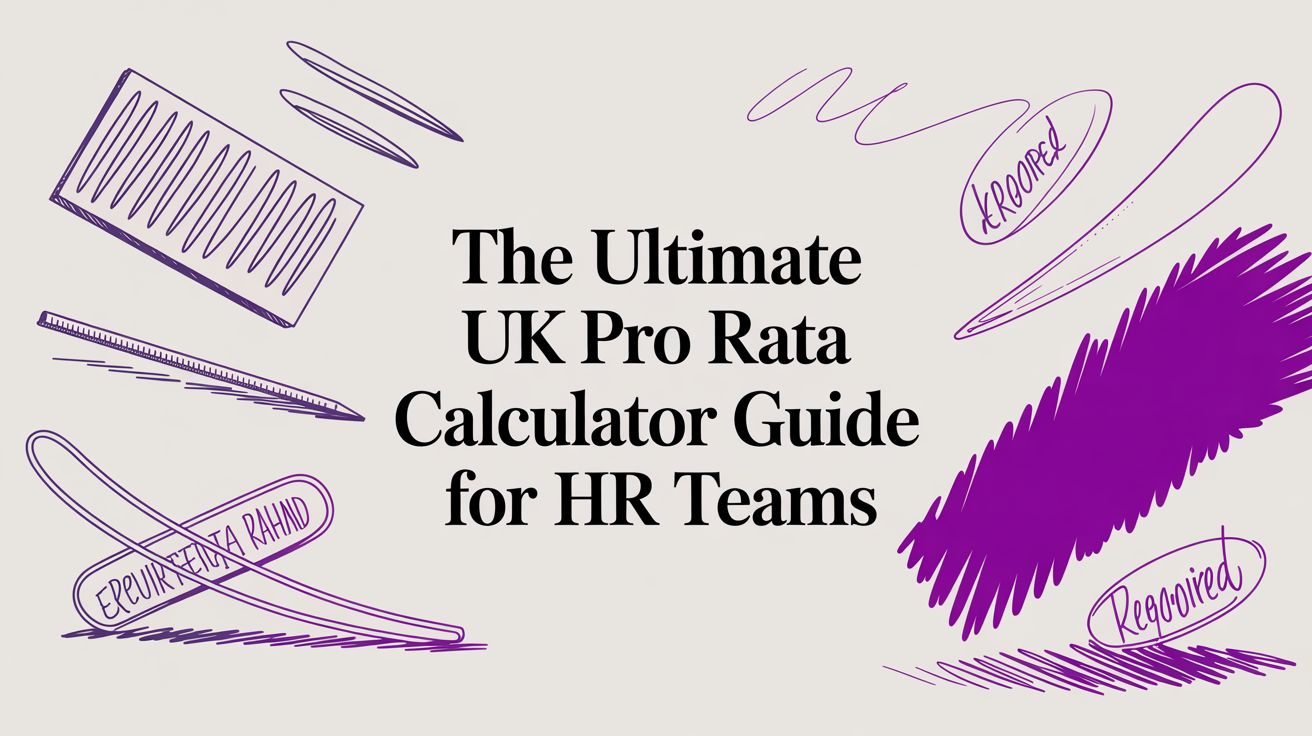Think of a probation period as a 'getting to know you' phase in a new job. It’s a set amount of time, usually between three and six months, where both you and your new employer can figure out if you’re a good match for each other.
It's a chance to see if the role is what you expected, if you click with the company culture, and if your performance meets the required standard.
What Is a Probation Period and Why Does It Matter?
Let's use an analogy. A probation period is a bit like the test drive before you buy a car. The brochure and the salesperson can tell you all the great things about it, but you only really know if it’s the right car for you once you get behind the wheel. This initial phase is vital for making sure the long-term journey is a smooth one.
A well-planned probation period employment agreement isn’t just a safety net for the business; it's a strategic tool for building a strong, lasting working relationship. It gives you a structured window to see how a new hire’s skills and work ethic translate from their CV into the real-world demands of the job.
The Two-Sided Assessment
It’s easy to think of a probation period as a one-sided test for the new starter, but that’s not the whole story. It’s very much a two-way street that gives power to both sides.
From the employer's point of view, the benefits are obvious:
- Risk Mitigation: It’s a lower-risk way to confirm a candidate can actually do the job before making them a permanent fixture in the team.
- Performance Evaluation: It provides a natural framework for setting clear goals from the outset and tracking progress against them.
- Cultural Fit Check: You get to see first-hand how the new person gels with the team, adapts to your way of doing things, and lives your company values.
But for the new employee, this period is just as important. It’s their chance to ask, "Is this job what they said it was? Do I actually enjoy the work? Does this company feel like the right place for me?" This mutual 'try before you buy' approach dramatically boosts the chances of long-term job satisfaction and retention.
Setting the Stage for Success
Ultimately, a good probation period is all about setting your new hire up for success. It formalises their onboarding, ensuring they get the right guidance, feedback, and support to find their feet and start performing at their best.
A thoughtfully managed probation period acts as a bridge between the recruitment process and a fully productive, long-term employment relationship. It’s not about catching people out; it’s about confirming the right choice was made and building confidence on both sides.
In the UK, probation periods typically last between three and six months. This is a crucial detail to get right, especially with changes on the horizon. A recent survey found that more than a third (36%) of UK organisations are thinking about extending their probation periods. Why? It's largely in response to potential shifts in employment law, like the proposed Employment Rights Bill. This bill could remove the two-year service requirement for unfair dismissal claims, making that initial assessment period more critical than ever for employers. You can learn more about the effective use of probation periods and performance management here.
By treating probation period employment as a strategic onboarding tool instead of a box-ticking exercise, businesses can dodge costly hiring mistakes, boost engagement, and build stronger, more effective teams right from the start.
Key Elements of a UK Probation Period
To ensure your probation period is fair, clear, and legally compliant, it's essential to include several core components in your employment contracts and company policies. The table below breaks down what you need to consider.
| Component | Description | Typical UK Practice |
|---|---|---|
| Duration | The length of the trial period. | 3 to 6 months is the standard. It should be long enough to assess performance but not excessively so. |
| Notice Period | The amount of notice required to terminate the contract during probation. | Usually shorter than the post-probation period, often 1 week for both employer and employee. |
| Review Process | The schedule and format for performance reviews. | Formal check-ins are common at the 1-month, 3-month, and final review stages. |
| Objectives | Clear, measurable goals the employee is expected to achieve. | Should be specific, realistic, and directly related to the job role (SMART goals). |
| Extension Clause | A provision allowing the employer to extend the probation period if needed. | Typically includes the right to extend once, for a further 1 to 3 months, with clear reasons provided. |
| Confirmation | The process for confirming successful completion of the period. | A formal letter confirming the end of probation and the move to permanent employee status. |
Having these elements clearly defined from day one prevents ambiguity and ensures everyone—from the new hire to their line manager and HR—understands the process and expectations. It provides a solid foundation for managing performance fairly and effectively.
Navigating the Legal Landscape of Probation Periods
It’s easy to think of a probation period as a legal grey area where the usual rules don't apply. Many employers fall into this trap, believing a new starter has few, if any, rights. That’s a costly mistake to make.
From the moment they walk through the door, your new hire is an employee, full stop. This means they are immediately covered by a whole host of fundamental protections under UK law. Even during their first few weeks of probation period employment, they are entitled to the basics: the National Minimum Wage, accruing paid holiday, and protection from discrimination under the Equality Act 2010. These rights aren't something they earn; they have them from day one.
So, what actually makes a probation period different from a legal standpoint? The key distinctions boil down to two main areas: notice periods and the right to claim unfair dismissal.
Key Differences in Employee Rights
During probation, the employment contract nearly always specifies a much shorter notice period—often just one week. This works both ways, giving the employee and the employer a quick and clean way to part company if it's clear the fit isn't right. This flexibility is really the core purpose of a probation period.
The most significant legal difference, though, is tied to unfair dismissal. Under current UK law, an employee generally needs two years of continuous service before they can bring an unfair dismissal claim to a tribunal. This is why many businesses feel they have more leeway during probation; for the most part, a dismissal within this timeframe won't lead to a successful unfair dismissal claim.
But—and this is a big but—there are critical exceptions. An employee can claim for "automatic unfair dismissal" from their very first day if the reason for letting them go is connected to:
- Discrimination: Firing someone based on protected characteristics like age, gender, race, or disability.
- Whistleblowing: Getting rid of an employee for raising legitimate concerns about wrongdoing.
- Asserting a Statutory Right: For example, dismissing them for asking to be paid the minimum wage or taking statutory parental leave.
It's absolutely crucial to remember that the two-year rule isn't a get-out-of-jail-free card. A fair, transparent, and well-documented process for any dismissal, even during probation, is your best defence against legal trouble.
The Impact of Forthcoming Legal Changes
The ground is about to shift under our feet when it comes to probation period employment. The upcoming Employment Rights Bill is poised to introduce major changes, making a formal, well-managed probation process more important than ever for staying compliant.
One of the bill's flagship proposals is to get rid of the two-year qualifying period for unfair dismissal, giving employees this protection from day one. To balance this, the government is looking at a new framework for probation. The proposal suggests a maximum probation period of nine months, during which employers would have more flexibility to dismiss employees, provided they follow certain procedural steps. You can read more about the outlook for UK employment law and explore the government's consultation on the maximum length of probation periods.
This legislative shake-up really highlights why a robust probation process is non-negotiable. Soon, you won’t be able to rely on the two-year rule. Instead, you'll need to prove you ran a fair and structured assessment from the very beginning. It's also vital to understand the nuances between different types of staff; our guide on what is a contingent worker can help clear up any confusion there.
As the law evolves, a well-managed probation period will become your primary tool for making sure a new hire is genuinely the right person for your business.
For any specific questions or to ensure your current policies are compliant, Phone 0845 855 0000 today.
How to Design a Watertight Probation Policy
A strong probation period doesn’t just happen—it’s built on the foundations of a clear, comprehensive, and legally sound policy. Think of your policy as the rulebook for a new hire’s crucial first few months. Without it, you're navigating a minefield of confusion, inconsistency, and potential legal headaches.
This rulebook needs to be firmly embedded in your employment contracts and company handbook. It should act as a clear roadmap, spelling out every step of the probation period employment process so that everyone, from the new starter to their manager, is on the same page from day one. Ambiguity is your worst enemy here; clarity is your greatest ally.
Core Components of Your Probation Policy
To create a policy that both protects your business and genuinely supports your new employees, there are a few non-negotiable clauses you absolutely must include. Getting these right removes the guesswork and sets up a fair, transparent framework for assessment.
Make sure you detail the following:
- Duration: State the exact length of the probation. In the UK, three to six months is the standard, but the key is choosing a timeframe that’s realistic for genuinely assessing someone's ability to do the job.
- Notice Period: Clearly define the shorter notice period that applies during probation, which is often just one week. This is the cornerstone of the flexibility that a probation period offers.
- Review Schedule: Don’t leave reviews to chance. Mandate specific check-in points—perhaps at the one-month and three-month marks, leading up to a final review just before the period ends.
- Extension Clause: It's vital to explicitly reserve the right to extend the probation period. This is for those cases where performance is promising but hasn’t quite hit the mark yet. Be sure to specify the potential length of any extension.
- Termination Procedure: Outline the exact process for ending employment during probation if things don't work out, ensuring it aligns perfectly with your contractual and statutory obligations.
By including these clauses directly in the contract of employment, you make them legally binding and ensure there are no nasty surprises for either party down the line.
Setting Measurable and Role-Specific Objectives
One of the most common pitfalls in managing probation period employment is the lack of clear, measurable goals. Vague instructions like "be a team player" or "get up to speed quickly" are impossible to assess fairly and leave you on shaky ground. Your policy must insist on creating specific, role-relevant objectives.
For instance, instead of a woolly goal, a new sales executive might have an objective like: "Complete product training and successfully shadow five client calls within the first month." A software developer's goal could be: "Independently resolve three low-priority tickets and contribute to one minor feature release within the first six weeks." These concrete targets give you a clear benchmark for performance.
A watertight probation policy transforms the assessment process from a subjective judgement call into an evidence-based evaluation. By defining success with measurable objectives, you create a fair process that empowers employees to succeed and gives managers the confidence to make informed decisions.
This level of detail is crucial for every role, whether you're a huge enterprise or a small, growing firm. For smaller organisations, establishing these solid procedures early on can be a real game-changer. Our guide on human resources for small business offers more insights into building these strong HR foundations from the ground up.
Communicating the Policy Effectively
Of course, a brilliant policy is useless if nobody knows it exists or understands how it works. This is where clear communication comes in. The probation policy should be a central part of your onboarding, not just a document buried in a folder somewhere.
On a new hire's first day, their line manager should sit down with them and personally walk them through the probation clause in their contract. This isn't just a box-ticking exercise. The conversation should cover:
- The purpose of the period as a supportive tool for success.
- The specific goals and expectations for their role.
- The schedule for check-ins and formal reviews.
- Who they can turn to for help and support.
This hands-on approach demystifies the whole process, helps ease new-starter anxiety, and sends a powerful message that you are invested in their success. When everyone is on the same page from the beginning, the probation period feels less like a daunting test and more like a collaborative journey.
Probation Period Policy Checklist for UK Employers
A solid policy leaves no room for doubt. Use this checklist as a quick reference to make sure you've covered all the essential bases for a UK-compliant and effective probation policy.
| Policy Element | Purpose | Status (Essential/Recommended) |
|---|---|---|
| Clear Duration | Sets a finite timeframe for the assessment period. | Essential |
| Shorter Notice Period | Provides flexibility for both parties if the fit isn't right. | Essential |
| Defined Review Schedule | Ensures regular, structured feedback and formal assessment points. | Essential |
| Right to Extend Clause | Allows for more time to assess performance if needed. | Essential |
| SMART Objectives | Provides clear, measurable goals for the new hire to work towards. | Highly Recommended |
| Link to Disciplinary/Capability Procedure | Clarifies how serious performance or conduct issues will be handled. | Recommended |
| Confirmation Process | Outlines the steps for formally confirming a pass in writing. | Essential |
By designing a policy that is both detailed and well-communicated, you create a legally sound framework that not only protects your business but also sets your new hires up for success right from the start.
If you need help creating or refining your probation policies, Phone 0845 855 0000 today.
Managing Performance and Delivering Effective Reviews
A well-written policy is one thing, but bringing it to life is another. This is where the human side of managing a probation period really kicks in. Performance management during this early stage isn't about catching people out—it’s about setting them up for success through regular, honest conversations.
Think of meaningful check-ins and reviews as the engine of a successful probation. They provide dedicated time to talk about progress, celebrate those early wins, and tackle any wobbles before they turn into bigger problems. When done right, these conversations build confidence, make expectations crystal clear, and drive real improvement.
The Art of the Constructive Check-In
Those informal chats are often just as valuable as the formal reviews you've scheduled. A quick "how are you getting on?" over a coffee can uncover worries or roadblocks that might not come up in a more structured meeting. For the first month, it's a great idea for managers to aim for these light-touch check-ins every week.
When it's time for a more formal review, preparation is everything. A manager should never go into a probation review cold. They need a clear agenda that’s all about constructive, forward-looking feedback.
A solid review meeting should always cover:
- Progress Against Goals: How are they tracking against the specific, measurable objectives you set at the start? Pinpoint where they're flying and where they might be finding things tougher.
- Company Culture and Team Fit: Chat about how they're settling into the team and getting used to the way you do things. Crucially, ask them how they're finding the environment.
- Feedback from Both Sides: This has to be a two-way street. The manager gives feedback on performance, but it's just as important to encourage the employee to share their own thoughts, challenges, and questions.
- Support and Resources: Don't be afraid to ask directly: "What do you need from me to succeed?" The answer could be anything from more training and better kit to just a bit more time with a mentor.
Giving Feedback That Motivates, Not Demotivates
The way you deliver feedback can make or break a new starter's experience. Vague comments like "you need to be more proactive" are completely unhelpful. Instead, root your feedback in reality by using specific examples.
For instance, instead of saying, "Your reports need more detail," try something like, "In the sales report from last Tuesday, it would have been really helpful to see the client feedback from the calls, like we talked about. Can we make sure we add that section next time?" It’s specific, actionable, and focuses on getting it right next time rather than dwelling on a past mistake.
The goal of feedback during probation is to coach, not to criticise. It’s about guiding a new hire towards success by providing clear, supportive, and actionable advice that helps them grow into their role and feel valued.
Documenting everything is non-negotiable. After every formal check-in, the manager should send a quick email summarising what was discussed, the actions you both agreed on, and the date of the next review. This creates a clear paper trail, protecting both the employee and the business from any future misunderstandings.
Fairly Addressing Underperformance
Sometimes, even with the best support, a new hire might struggle to meet the standards you need. How you handle this is a true test of your management skills. The first step is to get to the bottom of it—is it a gap in their skills, a simple misunderstanding of what’s expected, or a behavioural issue?
Once you have a better idea of the problem, you can put a supportive action plan in place. This isn't a formal disciplinary procedure; it's a clear, documented roadmap to help them get back on track.
This process should include:
- A Clear Conversation: Sit down with the employee and explain exactly where their performance is falling short, using those specific examples.
- A Written Plan: Write down the areas for improvement, the specific things they need to do, the support you’ll provide (like extra training), and a clear timeframe for the next review.
- Regular Follow-Ups: Schedule frequent, short check-ins to see how they're getting on and offer continuous support.
This structured and supportive approach gives the employee every possible chance to turn things around. It also means that if you do eventually have to consider ending their probation period employment, you can show you followed a fair and reasonable process. This not only builds a positive company culture but also puts you on much stronger legal ground.
For tailored advice on managing performance reviews or handling difficult conversations, phone 0845 855 0000 today.
Handling Probation Extensions and Terminations Fairly
As you reach the end of a probation period employment agreement, you’ll need to handle the next steps with real care and precision. If a new starter isn't quite hitting the mark, you're usually faced with two choices: give them a final chance by extending their probation, or decide to part ways.
Whichever route you take, the process has to be fair, transparent, and thoroughly documented.
The right call comes down to a clear-eyed assessment of the situation. Is the employee showing promise and just needs a bit more time to find their feet? Or are there fundamental gaps in their skills or attitude that feel unlikely to change? All those check-ins and reviews you've been doing should give you all the evidence you need to decide with confidence.
The Right Way to Extend a Probation Period
Extending a probation period shouldn't be a knee-jerk reaction or a way to put off a tough conversation. It's a constructive tool, but one you should only use when you genuinely believe the employee can get up to standard with a little more support.
So, when does it make sense? It's often the right move if:
- You can see real progress, even if they aren't quite at the finish line yet.
- Something got in the way, like a period of illness or a sudden shift in project goals, which meant they didn't get a fair crack at showing what they can do.
- You've spotted specific skill gaps that you're confident can be fixed with some targeted training in a defined timeframe.
If you do decide to extend, you must make it official in writing. The letter needs to be completely clear, stating the new end date (usually an extra one to three months) and spelling out exactly what improvements you need to see. You also need to set new, crystal-clear objectives for this extension and schedule regular meetings to keep a close eye on their progress.
This infographic lays out the key decision points you'll face during a probation review, helping you figure out if performance is on track or if an intervention is needed.
It’s a great visual reminder that every stage of the probation process should be a deliberate step based on solid criteria and open, honest communication.
Managing a Fair Termination Process
Sometimes, despite your best efforts and support, performance just doesn't improve. In other cases, there might be serious conduct issues. When this happens, termination may be the only realistic path forward.
While employees generally need two years of service to claim for unfair dismissal, a badly handled termination can still expose you to legal trouble. This could include claims for discrimination or wrongful dismissal if you've broken the terms of their employment contract.
A fair and respectful termination process protects your business legally and preserves your reputation as a responsible employer. It ensures that even when parting ways, the experience is handled with professionalism and integrity.
To navigate this tricky process correctly, follow these clear steps:
- Hold a Final Review Meeting: Formally invite the employee to a meeting to discuss their performance during the probation period employment. It’s good practice to let them bring a colleague or trade union representative with them.
- Present the Evidence: Clearly and calmly explain the reasons you're considering termination. You need to refer back to the specific goals they haven't met and the feedback you've already given them in previous reviews.
- Listen to Their Response: This is crucial. Give the employee a proper chance to explain their side of the story and mention any mitigating circumstances you might not be aware of.
- Confirm the Decision in Writing: After the meeting, follow up with a formal letter. This should confirm the termination, the reasons for it, their last day of employment, and the details of their final pay packet, including any accrued holiday.
- Adhere to the Notice Period: Make sure you honour the notice period stated in their contract—it’s typically one week during probation. Alternatively, you can provide a payment in lieu of notice if the contract allows for it.
Keeping a meticulous paper trail and communicating consistently are your best lines of defence against any legal challenges. It shows you've acted reasonably and fairly from start to finish.
For expert guidance on managing probation extensions or terminations, Phone 0845 855 0000 today.
Streamlining Probation Management with Dynamics 365 HR
Let’s be honest, juggling every moving part of a probation period can quickly become an admin headache. Between setting goals, chasing managers for reviews, and keeping all the paperwork straight, it’s a lot to handle. When you're relying on spreadsheets and a patchwork of calendar reminders, things inevitably fall through the cracks. It's a recipe for inconsistency and risk, which undermines the very purpose of having a probation period.
This is exactly where good HR technology steps in to save the day. A system like Microsoft Dynamics 365 HR isn't just a database; it’s a way to connect your entire probation strategy from start to finish. Imagine a new starter’s goals being set automatically during onboarding, managers getting timely nudges to schedule their check-ins, and every piece of feedback being logged securely in one central employee profile. This isn't some futuristic fantasy—it's what smart businesses are doing right now to build more efficient and compliant teams.
Automating for Consistency and Compliance
One of the biggest wins you get from a proper HR platform is the power to build a standardised, automated workflow for your probation process. It’s all about making sure every new hire gets the same professional experience and that every manager follows the right steps, every single time. No exceptions.
Here’s what that looks like in practice:
- Onboarding Checklists: New hire starts? The system automatically triggers tasks for them, their manager, and the IT team. Nothing gets forgotten.
- Automated Review Reminders: Those crucial 1-month, 3-month, and final reviews won't get missed. The system sends out alerts, prompting managers to prepare and hold the meetings on time.
- Performance Goal Tracking: You can set clear, measurable objectives right inside the system and see how the employee is tracking against them.
- Secure Document Management: All your review notes, feedback forms, and signed letters are stored in one place that’s fully GDPR-compliant.
This screenshot from Dynamics 365 HR gives you a feel for how a central dashboard brings everything together.
As you can see, the interface is built to give HR managers a quick, at-a-glance view of workforce data, outstanding tasks, and employee development progress—perfect for keeping an eye on multiple probation periods at once.
When you embed your probation policy into a system like Dynamics 365 HR, you’re turning it from a static document into a living, automated process. This slashes the admin burden, drives consistency, and gives you a clear, auditable trail for compliance.
For any UK business, that level of control is gold. It gives you a solid framework for managing the probation period employment phase fairly and effectively, showing you’re serious about employee development while also protecting the business. To get a better idea of how this could work for your company, you can explore the full capabilities of HR Management for Microsoft Dynamics 365. Using the right tools is a smart way to master this crucial part of HR.
For a personalised demonstration or to discuss your specific needs, phone 0845 855 0000 today.
Your Questions on UK Probation Periods Answered
To wrap things up, let's dive into some of the most common questions we hear about probation periods in the UK. Think of this as your go-to reference for handling those tricky, real-world scenarios with confidence.
Can an Employee Take Sick Leave During Probation?
Yes, absolutely. An employee on probation has the same statutory right to sick leave as anyone else on your team. This means they are entitled to Statutory Sick Pay (SSP) as long as they meet the usual criteria, like earning enough and letting you know they're unwell.
Your own company policy on sick pay over and above the legal minimum will also apply, just as it’s laid out in their contract. The key is to handle sickness during probation fairly and consistently, so there’s never a whiff of discrimination.
Do Employees Accrue Holidays During Probation?
They certainly do. Holiday entitlement starts building up from day one of employment. A new starter on probation accrues paid leave exactly like a long-serving member of the team.
And if things don't work out and their employment ends, you must pay them for any holiday they've earned but haven't taken.
What Is a Typical Notice Period During Probation?
It's usually much shorter. A one-week notice period is pretty standard, and it typically applies to both the employer and the employee.
This detail must be clearly spelled out in the employment contract to be legally effective. It gives both sides a clean and simple way out if it becomes clear the job isn't the right fit.
Is a Formal Hearing Required to Dismiss Someone on Probation?
This is a great question. While an employee with less than two years of service can't claim for unfair dismissal, you still need to follow a fair and reasonable process. That doesn't always mean a full-blown formal hearing, but you absolutely should:
- Sit down with them to discuss the performance or conduct issues.
- Clearly explain your reasons for considering dismissal, backed up by evidence.
- Give them a proper chance to respond and put forward their side of the story.
Following these steps helps protect you from claims of wrongful dismissal or discrimination, which can be brought from the very first day of employment.
It's also worth remembering that probation practices don't exist in a vacuum. They can be influenced by broader UK legislative changes. For instance, recent shifts in the national probation service have changed how employment outcome data is collected. A recent statistical update noted that 37.8% of certain offenders were in a job six months after release, but these figures are now interpreted differently due to new reporting methods. You can find the full breakdown in this offender employment outcomes statistical summary on gov.uk.
At DynamicsHub, we help you build robust, automated HR processes directly within your Microsoft ecosystem. To learn how Dynamics 365 HR can streamline your probation management and ensure compliance, Phone 0845 855 0000 today.







